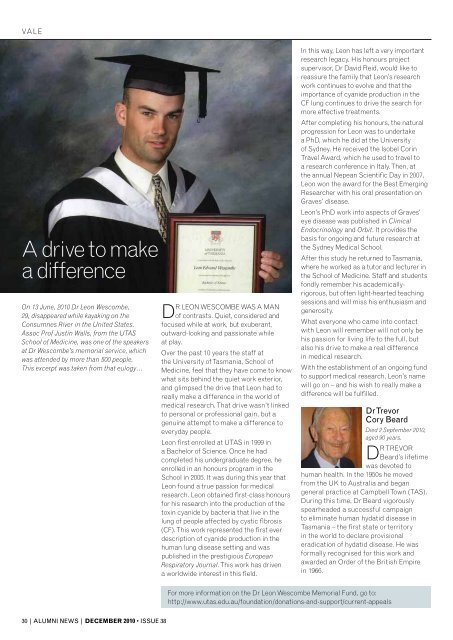GENERATIONS AT UTAS - Alumni & Friends - University of Tasmania
GENERATIONS AT UTAS - Alumni & Friends - University of Tasmania
GENERATIONS AT UTAS - Alumni & Friends - University of Tasmania
Create successful ePaper yourself
Turn your PDF publications into a flip-book with our unique Google optimized e-Paper software.
vALe<br />
A drive to make<br />
a difference<br />
On 13 June, 2010 Dr Leon Wescombe,<br />
29, disappeared while kayaking on the<br />
Consumnes River in the United States.<br />
Assoc Pr<strong>of</strong> Justin Walls, from the <strong>UTAS</strong><br />
School <strong>of</strong> Medicine, was one <strong>of</strong> the speakers<br />
at Dr Wescombe’s memorial service, which<br />
was attended by more than 500 people.<br />
This excerpt was taken from that eulogy…<br />
30 | ALuMNI NeWs | DECEMBER 2010 • Issue 38<br />
DR LeoN WeSCoMBe WAS A MAN<br />
<strong>of</strong> contrasts. Quiet, considered and<br />
focused while at work, but exuberant,<br />
outward-looking and passionate while<br />
at play.<br />
over the past 10 years the staff at<br />
the <strong>University</strong> <strong>of</strong> <strong>Tasmania</strong>, School <strong>of</strong><br />
Medicine, feel that they have come to know<br />
what sits behind the quiet work exterior,<br />
and glimpsed the drive that Leon had to<br />
really make a difference in the world <strong>of</strong><br />
medical research. That drive wasn’t linked<br />
to personal or pr<strong>of</strong>essional gain, but a<br />
genuine attempt to make a difference to<br />
everyday people.<br />
Leon first enrolled at <strong>UTAS</strong> in 1999 in<br />
a Bachelor <strong>of</strong> Science. once he had<br />
completed his undergraduate degree, he<br />
enrolled in an honours program in the<br />
School in 2005. It was during this year that<br />
Leon found a true passion for medical<br />
research. Leon obtained first-class honours<br />
for his research into the production <strong>of</strong> the<br />
toxin cyanide by bacteria that live in the<br />
lung <strong>of</strong> people affected by cystic fibrosis<br />
(CF). This work represented the first ever<br />
description <strong>of</strong> cyanide production in the<br />
human lung disease setting and was<br />
published in the prestigious European<br />
Respiratory Journal. This work has driven<br />
a worldwide interest in this field.<br />
In this way, Leon has left a very important<br />
research legacy. his honours project<br />
supervisor, Dr David Reid, would like to<br />
reassure the family that Leon’s research<br />
work continues to evolve and that the<br />
importance <strong>of</strong> cyanide production in the<br />
CF lung continues to drive the search for<br />
more effective treatments.<br />
After completing his honours, the natural<br />
progression for Leon was to undertake<br />
a PhD, which he did at the <strong>University</strong><br />
<strong>of</strong> Sydney. he received the Isobel Corin<br />
Travel Award, which he used to travel to<br />
a research conference in Italy. Then, at<br />
the annual Nepean Scientific Day in 2007,<br />
Leon won the award for the Best emerging<br />
Researcher with his oral presentation on<br />
Graves’ disease.<br />
Leon’s PhD work into aspects <strong>of</strong> Graves’<br />
eye disease was published in Clinical<br />
Endocrinology and Orbit. It provides the<br />
basis for ongoing and future research at<br />
the Sydney Medical School.<br />
After this study he returned to <strong>Tasmania</strong>,<br />
where he worked as a tutor and lecturer in<br />
the School <strong>of</strong> Medicine. Staff and students<br />
fondly remember his academicallyrigorous,<br />
but <strong>of</strong>ten light-hearted teaching<br />
sessions and will miss his enthusiasm and<br />
generosity.<br />
What everyone who came into contact<br />
with Leon will remember will not only be<br />
his passion for living life to the full, but<br />
also his drive to make a real difference<br />
in medical research.<br />
With the establishment <strong>of</strong> an ongoing fund<br />
to support medical research, Leon’s name<br />
will go on – and his wish to really make a<br />
difference will be fulfilled.<br />
Dr Trevor<br />
Cory Beard<br />
Died 2 September 2010,<br />
aged 90 years.<br />
DR TRevoR<br />
Beard’s lifetime<br />
was devoted to<br />
human health. In the 1950s he moved<br />
from the UK to Australia and began<br />
general practice at Campbell Town (TAS).<br />
During this time, Dr Beard vigorously<br />
spearheaded a successful campaign<br />
to eliminate human hydatid disease in<br />
<strong>Tasmania</strong> – the first state or territory<br />
in the world to declare provisional<br />
eradication <strong>of</strong> hydatid disease. he was<br />
formally recognised for this work and<br />
awarded an order <strong>of</strong> the British empire<br />
in 1966.<br />
For more information on the Dr Leon Wescombe Memorial Fund, go to:<br />
http://www.utas.edu.au/foundation/donations-and-support/current-appeals


